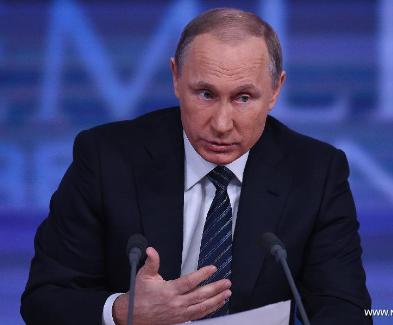MOSCOW, January, 1st (Xinhua) -- Russian President Vladimir Putin approved the updated national security strategy, and a relevant decree was published on the official legal information web-portal on Thursday. Russia has outlined its priorities in international stage, setting vectors of military development.
According to the new strategy development of relations with CIS countries, states of the Eurasian Economic Union and CSTO was defined as one of the most important directions of foreign policy. In particular, Russia advocates for turning CSTO into "universal international organization capable of countering regional challenges and threats of a military-political and military-strategic nature."
Russia also enhances cooperation within such organisations as BRICS /Brazil, Russia, India, China, South Africa/, RIC /Russia, India, China/, SCO, APEC forum and the Group of 20. The Russian Federation plans to develop a comprehensive partnership and strategic interaction with China, considering it as the key factors in maintaining stability in the region and world in whole, and also provides for building a privileged strategic partnership with India. In addition, the country stands for development of reliable non-block mechanisms of regional stability in the Asia-Pacific region. All these provisions were not included in the previous version of the national security strategy.
According to the document "Russian Federation stands for strengthening mutually beneficial cooperation with European countries, European Union, for harmonization of integration processes in Europe and former-Soviet states, as well as formation of the open common security system in the Euro-Atlantic region on clear contractual basis".
"The Russian Federation is interested in establishing a full-fledged cooperation with the United States of America based on the common interests, including economic interaction, and taking into account the key influence of Russian-American relations on the international situation as a whole," the next paragraph states.
The main areas of partnership between Russia and United States are arms control improvement, facilitation of confidence-building measures, resolving of issues associated to non-proliferation of mass destruction weapons, expansion of cooperation in the fight against terrorism and reconciliation of cross-regional disputes. It must be mentioned that the same goals were indicated in the previous national security strategy, published in 2009.
"For Russia a determining factor in relations with NATO is the alliance's continuous unacceptable building up of the military activity and bringing its military infrastructure closer to Russian borders, creating an anti-missile defense system, endowing the alliance with global functions that are being implemented in violation of international law requirements," as indicated in the section dedicated to relations with the North Atlantic Alliance.
At the same time, Russia is ready to develop relations with NATO on an equal footing "in order to deepen general security in the Euro-Atlantic region". "The depth and content of such relations will be determined by the readiness of the alliance to take into account legitimate interests of Russia in military-political planning and respect regulations of international law," reads a clause in the text of the strategy, according to the clause of the strategy which was also present in the 2009 edition of the latest.
"In the field of international security, Russia remains committed to using, first of all, political and legal instruments, diplomacy and peacemaking policies. The use of military force for protection of national interests is permissible only if all non-violent measures proved to be ineffective," the document says.
"In order to maintain strategic stability, the Russian Federation is ready for further discussions on nuclear capacity reduction according to bilateral agreements and in multilateral formats as well, and also assists in provision of the appropriate facilities providing an opportunity to reduce nuclear weapons without prejudice to international security and strategic stability," the document specifies.
The new national security strategy comes into force from the date of its signing and has already replaced the previous 2009 edition of the latest, which was signed by D. Medvedev, as the former President of the Russian Federation.
Source: russian.news.cn
Write to us
Write to us
- 5 Sovetskaya str., Block A, Novosibirsk, Russia
-
